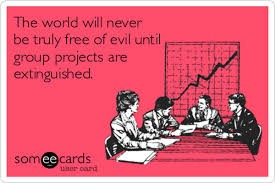To continue our discussion about professional communication, Margaret Bryant ‘16 will highlight the importance of remaining focused and neutral in any group setting and how being self-aware in such situations is key to accomplishing great group work.
It’s no surprise that group projects tend to have the reputation as the bane of your educational experience, especially in college. Once in a while, all of the stars in the academic universe align and you find yourself with the perfect assignment, the perfect idea, and the perfect group dynamic. Throughout your academic career you’ll have worked on more group projects than you’ll care to remember years afterwards. And collaboration won’t stop there! Many professional environments require working in groups and there are many blogs and other websites that provide Tips for Better Team Work.
Group project angst is so common that it is even referenced through popular culture through sites like Buzzfeed. There are the stereotypical group members: the overachiever, the control freak, the slacker, the one who’s MacBook eats his contribution the night before the presentation, and the over-caffeinated energizer bunny who is endlessly optimistic about the outcome of the project, no matter how bad it seems. Although these aren’t the only and ever present group members, they definitely exist.
In an academic setting, or professional one for that matter, group work has a tendency to go one of two ways: everyone puts in equal effort and work productively to accomplish their goals and benefit from the various abilities and skills in the collective group, or it’s a miserable process in which group members are unwilling to compromise, and sometimes one person ends up doing significantly more work than the rest of the team. The bottom line is that group work doesn’t have to been all fire, brimstone, and torture, and this is often something addressed in PWR classes like Cupid.
The ENG 282 Cupid Studio curriculum includes a collaborative assignment in which students work in small groups on client-based projects. My group is working on marketing the Multimedia Authoring Minor to Elon students. When we first began discussing the client-based projects, RPR took the time to honestly address the positives and negatives of working in a group. As a class, we identified what we felt were the golden rules of successful collaboration.
- Communicate effectively, and in a timely manner.
- Be committed and accountable to each other and to joint deadlines.
- Accept, encourage, respect, and integrate feedback.
Prior to meeting with our clients or really digging into the work, RPR had each group compose a contract establishing ground rules and giving us a document to which we can hold ourselves. Between the four of us, we addressed the topics of how to most effectively communicate with one another, how to address conflicts, and how best to receive and offer constructive criticism. The universal part of our contract is a commitment to not only keeping ourselves accountable, but also keeping each other.
In my group, the general consensus was that the most important part of maintaining a comfortable, productive, and creative working environment is having an awareness of yourself and those around you. Personally, being self-aware when working in a group means that I acknowledge the things that could be distracting myself from the work, and I leave my baggage at the door. As a group, we have generally found more success when we acknowledge issues and outside distractions and briefly check-in with ourselves before starting tasks as to avoid later problems.
One of the benefits of group work is that you aren’t doing the entire project on your own. Your group members can pick up the slack, which is much better than the alternative of your lack of time or ability to complete your work having a greater negative impact on the project as a whole. While a check in shouldn’t be a therapy session, I feel it is often helpful to identify any major issues in order to separate any outside negativity from the work itself. Although not all methods work for all people, this is certainly one that has worked for us and made our collaborative experience and creative process a positive one.
Check out these resources for tips and other ways to make group work successful!:
http://www.cs.cmu.edu/~pausch/Randy/tipoForGroups.html
http://www.usatodayeducate.com/staging/index.php/campuslife/seven-tips-for-surviving-a-group-project



 Follow
Follow